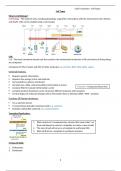Class notes
Cell Types (Biomedical Science)
- Course
- Institution
- Book
This document provides a comprehensive overview of cell biology, focusing on the fundamental unit of life: the cell. It covers the essential components and functions of cells, as well as the differences between prokaryotic and eukaryotic cells.
[Show more]




